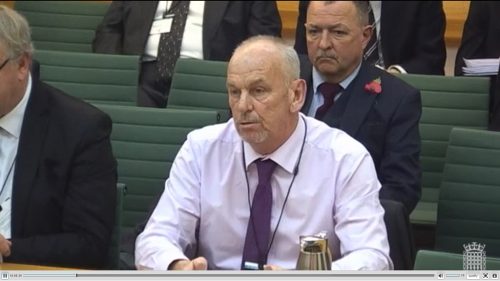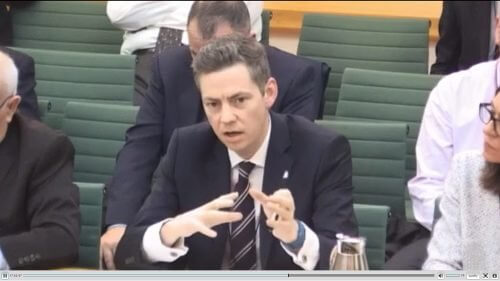
In a public meeting, the committee speaks to representatives on both sides to discuss the issues raised in the sector recently
The Transport Committee has held a public meeting on the topic of Community Transport (CT), which took place in the late afternoon of Monday, November 13.
The coach and bus industry’s view
The meeting was broken into two parts, with the first inviting Steve Salmon, Director of Policy Development at the CPT, and Martin Allen, Director of the Bus and Coach Association (BCA) to speak.
The meeting began by highlighting the viewpoint that in broad terms, the existing permit system was working well and asking the witnesses if they accepted that most permits were legitimately earned and used.
Steve responded: “Illegitimate permits are a tiny minority, and I think the system is working in terms of identifying organisations which need a particular licensing approach.”
Martin disagreed, stating: “None of us want to see the permit system go, it’s a case of the use and abuse of them. In our investigations, we’ve found it to be more widespread and some operators hold up to 500 permits, which cannot be right.
“There are now around 400 issuing bodies for these permits, and the Department for Transport (DfT) does not know how many are being issued.”
The committee scrutinised Martin’s claim that there are around 150,000 permits in use, which was a figure extrapolated from 2007 data. This data stated that 90,000 permits were in use at the time, with an additional 5,000 issued per annum. However, while there was no definitive evidence of this quantity, both Martin and Steve agreed that the actual number in use is extremely difficult to track because of a lack of record keeping.
Widespread issue
Martin pointed out how widespread he feels the issue of CT operators competing with commercial operators is: “The only council we found that did not allow CT operators to tender was the Borough of Richmond, because its law department had looked at it, determined the work as for hire and reward and required an O-licence.
“I don’t accept that it’s only a few areas that see conflict between community transport and commercial operators.”
Steve disagreed, commenting: “I do see it as a localised problem, but if the system is not right, the problem could pop up somewhere else.”
State aid
Martin questioned why CT operators were chasing school contracts when they received sufficient funding to cover their other services without needing to cross-subsidise.
On the question of whether the issues should be addressed locally, because of the highly variable nature of CT, Steve responded: “I think it does need a more considered national framework. Small charities and small enterprises actually are not that different in the community at the end of the day, and we need to have a another look at what the rules are protecting the public around their activities.”
“It’s got to be national,” Martin echoed.
Refusal to change regulations
Asked whether the problems arose from the misinterpretation of regulations, Martin stated that the DfT has been receiving complaints on the subject for years. He claimed in six years of campaigning, the DfT has only replied to a single email.
“A lot of these complaints have been ignored,” he said. “The CPT challenged the DfT two years prior to the 1071 regulation coming in and colleagues have been challenging various departments for 10 years.
“The 1071 is a unique regulation, and it was down to the DfT to alter our own transport legislation to allow the full adoption of the EU regulation, but that was never done.”
Steve agreed, stating: “It’s not a case of misinterpreting UK legislation, but a case of UK legislation not moving in step with what’s happening with EU regulation.
“We challenged the DfT and agreed to disagree in 2009. We felt the DfT needed to amend the legislation, they didn’t. We sought legal advice, which indicated it was not so clearly unreasonable that we would obviously win if we took them to court, so we didn’t.”
Martin added: “We made the complaint to EU commission in March 2014. The infraction notice was issued in April 2015, two and a half years ago.
“It has taken three and a half years to get to this stage.”

O-licences
Martin said since the DfT letter he has seen ‘very little movement towards applying for O-licences.’
He added: “You’ve got to hold local authorities and the Government to account on the interpretation of the regulation. I think all the bodies surrounding this need to work out a way forward so that vital services can continue under the permit.”
Thoughts of the community transport sector
The second part of the meeting involved Bill Freeman, CEO of the Community Transport Association (CTA), Frank Phillips, Chairman of Erewash Community Transport, and Anna Whitty, a member of the Mobility Matters steering group.
Frank Phillips introduced himself as representing the organisation ‘with the allegations against it from the DVSA’ and suggested: “It appears we’ve been found guilty already by the letter from the DfT.”
The panel was asked whether the progress of the Erewash Community Transport case should affect the timing of the DfT’s proposed consultation.
“Yes,” Bill said. “As it’s a live case and is yet to run its full course, the nature and content of that consultation cannot be fully appreciated. It’s important that process is complete before any judgement is made of its wider implications.”
Anna added: “It feels to me that no decisions have been made and the DfT appears to not understand the complexity of community transport, or the impact on users.”
Frank agreed, and noted that many county councils were already setting timetables for the withdrawal of section 19 permits.
“That’s not just one council, but the common position of Nottinghamshire, Derbyshire and Staffordshire,” he added. “By the time the consultation is over, I may be out of business.”
The DfT bombshell
The panel described the shock of receiving the DfT letter.
Bill said: “I think the DfT had to do something. Whether or not we agree with the nature and content of that letter in its entirety, I think there was going to be a problem. If the DVSA’s letter had been issued to a CT operator with no over public communication, we would have witnessed the complainants having a free run at communicating in an accurate and misleading way what the implications were.
“I think the DfT was seeking to manage they way the letter was talked about. If the aim was for the letter to provide reassurance, it has not, but if the aim was to manage a piece of news to prevent misleading and inaccurate reporting, they were right to put something out.”
Authorities cutting contracts
Bill spoke about how councils appeared to be wary of issuing further contracts and permits to CT operators: “Even if there is a lack of clarity, the default position is to act conservatively to avoid challenges in the future.”
Frank said that he was aware of one council estimating a 50% increase in its transport budget if they cease section 19 permits, from £1.6m to £2.4m. He also said a CT operator in Derbyshire, Clowne CT, ceased to operate on September 1.
Anna said that she was aware of some operators attempting to obtain O-licences, but faced BCA objections to a CT operator being granted one.
Not just a legal matter
Bill stated that the matter at hand was far more than just a case of tidying up legislation.
He said: “If you remove providers of transport who are helping people without any other means of getting out of the house, there are the additional costs to them of losing their independence and to local social care and NHS.
“The Government has said it is mindful that this is not simply tidying up a legal matter, but it has also indirectly implied that there is a concern around safety.
“We have not seen anything in any previous communications which implied there are any concerns around the safety of CT passengers.
“There is also no evidence to suggest this. Some of the things the Government has said may have unhelpfully implied that there are.”

